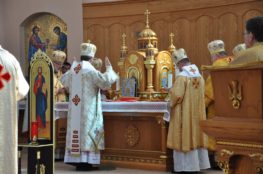When it comes to the Eastern Catholic churches there are two extreme “schools of thought” on how they are “to be.” The first, which I will call the “Latin school,” holds that the Eastern churches ought to conform themselves fully to Western Catholic forms with some minimal space given to their unique, “exotic” elements. In other words, the Eastern churches should resemble the Latin Church in theology, spirituality, and ecclesiastical structure with “allowances” or “tolerance” given for certain liturgical elements and pious practices. On the level of doctrine, the Eastern churches ought to express themselves in a Latin idiom, removing all articulations which do not conform to Scholastic or semi-Scholastic formularies. Although the Latin Catholic Church has steadily drifted away from this “school of thought” over the past 50 years, many traditional Latin Catholics still hold fast to this belief out of chauvinism, ignorance, or both.
The other extreme, what I will call the “anti-Latin school,” holds that everything which appears to be rooted in Latin theology, spirituality, or ecclesiastical structure is not just alien to the East, but presumably defective as well. The East, according to this line of “thinking,” is essentially defined by being “not Western” (whatever that means) and has nothing to learn from Latin Christianity (though Latin Christianity has much to learn from it). On the level of doctrine, the “anti-Latin school” maintains a general agreement with the Latin Catholic Church on most first-millennium “essentials” while feeling entitled to ignore or discard any and all second-millennium doctrinal developments, particularly those associated with the Council of Trent and the First Vatican Council.
Situated somewhere between these two poles is everyone else, though only Eastern Catholics are likely to give this reality any careful thought. Eastern Catholics, particularly those living in the geographic West, are compelled to live out the tension of existing in a “Latin normative” ecclesiastical space while also trying to retain their heritage — which is part of the heritage of the Universal Church — in full. Some claim there is a “golden mean” to be found, but it often seems to exist as a theoretical rather than a practical point. This raises the unsettling question of whether or not, at this moment in history, it is possible for Eastern Catholics to “be themselves” without compromises or contradictions. It is that question which I plan to probe in due course.




March 28, 2016
My current plan is to engage in a self-tuition of a close reading of Scripture, then the Church Fathers (in translation, and later, in the original), and the Seven Ecumenical Councils, just to get acquainted with the fundamentals of the Faith. Then I intend on working my way through what the West calls the remaining Ecumenical Councils (although the East, alas, was not involved in them), just to see whether they are consistent with the first eight centuries of the Faith.
My suspicion is that the West began to go off the rails with the development of the Cathedral Schools after Charlemagne, and that the progressive train-wreck got worse with the Schoolmen. Of course, having clearly stated this at the outset, I shall take some pains to try to look beyond my own confirmation bias. We shall see.
March 28, 2016
Re: Schoolmen
I don’t know. I don’t tend to buy the idea that Scholasticism is a late-medieval Western innovation. Clearly the roots of Scholasticism can be found in the East and there was a concentrated Byzantine scholasticism which lasted up to the fall of Constantinople and, arguably, continued on in Kyiv and Moscow up through the 19th Century. With that said, was Scholasticism on the whole uniformly good? No, though it wasn’t uniformly bad either. I think the best of Scholasticism can be seen in the thought of someone like St. Thomas Aquinas, specifically the great synthesis of theological and philosophical learning he accomplished in the Summa.
April 1, 2016
the West began to go off the rails with the development of the Cathedral Schools after Charlemagne
WADR, that whole go-off-the-rails shtick is straight out of the Bapticostal Fundagelical playbook. Only the supposed dates differ. E.g.: Did it happen right after the last apostle died? Or with Constantine? Or, as here, with the rise of the Schools? Or maybe all three? Jack Chick, call your office!
Meanwhile, the whole idea that the Church Jesus founded upon Peter the Rock could seriously “go off the rails” makes a mockery of Our Lord’s promise that said Church would withstand the “gates of hell” until the end of time.
But what did Jesus know? Protestant revisionists and their Eastern sympathizers know better.
April 1, 2016
Diane, do please try to read all that I have written, rather than taking one statement out of its context. And do please try to use somewhat less inflammatory prose in responding. Otherwise, you will simply confirm my opinion of you: that you are a troll.
March 28, 2016
Recall that the Schoolmen were a mixed bag of nuts, ranging from John Scotus Eruigena all the way up to Tommy the Ox himself. I frankly like and enjoy a number of the things that came out of the Scholastic movement, including the works of SS. Bonaventura and Aquinas. I suspect that the mischief came in not with the saints themselves, but with the pack of logic chopping monkeys in Roman collars that came after them. Anyhow, I intend on investigating further, rather than simply dwelling in my prejudices.
April 1, 2016
Anyhow, I intend on investigating further, rather than simply dwelling in my prejudices.
Well, that is a good thing. 🙂
Plus, remember that every communion is chock full of nuts. If mixed nuttiness is for your criterion for “going off the rails,” well, then you’ve just described the entire human race, haven’t you?
April 1, 2016
Thank you, Diane. And as for the ‘chock full of nuts’, I am reminded of an inspirational saying that goes something like, “Just remember that the mighty oak was just a nut like you.” Cheers.
March 28, 2016
This problem also exists, though in a different form, for those of us whose heritage is the Latin tradition (Celtic folk, Germanic, &c.), yet who are Orthodox — especially those of us who don’t give up all of our practices (My daughter and Russian wife fall asleep to me while I –still– say Compline using the Sarum form, singing basically Gregorian tones, though I am not “Western Rite”).
March 28, 2016
I can see that. There certainly is “institutional pressure” within American Orthodoxy for people to shed all elements of “Westernism” which may lurk in their thinking and piety, though certain pockets of American Orthodoxy have deeply internalized and made elements of Evangelicalism “normative” (which I have long been suspicious of).
Byzantine chauvinism is no less a problem than Latin chauvinism, whether one is discussing liturgy, theology, etc. One of the unique features of Latin chauvinism is a sense of triumphalism in numbers, that is, because Latin Christianity is the dominant form of Christianity in the Catholic Church (if not the West), it must be seen as normative and correct at the expense of everything else.
March 28, 2016
A worthy endeavor, Gabe. As Antiochian I do wish the EO Church had room for something other than the anti-Latin school. However, they rightly fear the Latin-normative expressions of the RC Church. Even at the highest levels of both Churches this incommensurability shows itself…it’s not just an “uneducated laity” problem.
If I could offer any input I would ask that you consider the culture of the EO Church as an important facet of your endeavor.
March 29, 2016
One thing I’ve wondered about is, how much of the historical Eastern Catholic experience is conditioned by the fact that the acts of union which brought the Ukrainians and Ruthenians into the Roman fold were concluded during the height of the Counter-Reformation? With the Latin Church and the papacy in full-blown lockdown mode at the time, it would seem that hopes for a happy reunion without absorption were bound to be dashed. Perhaps the Council of Florence was a golden opportunity that all parties let slip through their fingers.
That said, I don’t really know all that much about the history of this stuff… anyway, looking forward to an interesting series of posts.
March 29, 2016
One more thing — don’t be *too* ready to throw all Latin traditionalists into the “Latin school” you mention. The way I see it, there are two types of trads out there.
The first group are the people who love the Latin Mass because that’s how it was done before the hierarchy introduced Clown Masses, religious liberty, and generally starting acting all gay. This group is likely to complain about how long High Mass lasts, talk about how awful the drive from their houses deep in the woods into the city for the Latin Mass is, and how Democrats want to take their guns away. Remove the Fatima bumper stickers from their 12-passenger vans, and these people fit right in with Evangelicals. These people are trads because they think extreme conservatism is awesome, and what’s more conservative that Latin? These people are likely to fall into the Latin School.
The second group — a not insignificant number — consider themselves trads because they love tradition for its own sake; these people love the Latin Mass because it’s beautiful, ancient, and developed organically over the centuries, not because it’s what was done in the 50s. Folks like this tend to have a natural love for the East because of the beauty and history which is readily apparent and accessible in Eastern worship and piety. These people, quite naturally, definitely don’t fall into the Latin school
Unforunately, Latin School people tend to dominate the attention — most of the regular contributors to trad publications like the Remnant, Catholic Family News et al. are of the Latin School.
April 6, 2016
I definitely agree with this. On the other hand, some of the first group are only there because of ignorance. I know I was, until I researched more and now I am in the second group.